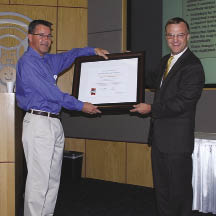| |
 Jim Keller of ECRI Institute (right) presents the 2008 Achievement Award to Bill Lammers, administrative manager of radiology for Children's Hospital of Omaha, Nebraska. Jim Keller of ECRI Institute (right) presents the 2008 Achievement Award to Bill Lammers, administrative manager of radiology for Children's Hospital of Omaha, Nebraska. |
The winning entry for the 3rd Health Devices Achievement Award, presented by ECRI Institute in September 2008 to honor excellence in health technology management, is an outstanding example of how steadfast commitment to improving operational performance can lead to enhanced procedures and patient care.
Learn about the other submissions that achieved recognition.
Children's Hospital of Omaha, Nebraska, undertook an initiative that aimed to reduce unnecessary x-ray exposures and decrease errors in x-ray order entry. It accomplished these goals with two simple changes:
Indications for chest and abdominal x-rays were listed as a required field in the electronic orders, via a dropdown menu.
Instruction fields for isolation and transport within the x-ray order were populated automatically.
By implementing evidence-based indicators within the x-ray order process, the hospital reduced the number of x-rays for pediatric patients—for whom radiation-linked cancer risks are particularly high—in addition to decreasing order changes and reducing radiology technician time spent on follow-up and modification. As a result, the x-ray order process was streamlined and re-prioritized.
The changes also ensured that patients requiring oxygen or isolation precautions continued to have those needs met when sent for x-rays. And the hospital's residents have also greatly benefited from the initiative because they are now able to receive concrete direction when ordering radiology tests.
The hospital cited two key lessons learned from this project: First, listen to your staff when looking for processes that need improvement. Second, don't ever assume that a process is so basic or so simple that it can't be improved.
In judging this submission, ECRI Institute staff were particularly impressed by the project's impact on patient safety and on the efficiency of operations for the hospital's intensive care patients.
"One of the goals for this award is to give us a way to honor our member hospitals' commitment to technology management by achieving high standards of safety, quality, and cost-effectiveness in healthcare," said James P. Keller, Jr., ECRI Institute's vice president for health technology evaluation and safety. "This project helped to significantly decrease unnecessary x-rays in a patient population where it is so important to minimize radiation dose, while allowing clinical staff to spend more time on the high-quality care patients need. Children's Hospital of Omaha should be commended for its fine work on this project."
"We are absolutely thrilled to have been selected for this award," said Mel Hall, performance improvement and patient safety manager for Children's Hospital. "The acknowledgment helps to underscore our continuous effort to improve patient care through our quality and safety initiatives. I am delighted that this project has improved internal processes and, most importantly, the level of care we provide to our patients."